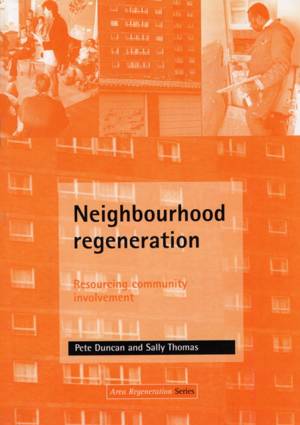
- Afhalen na 1 uur in een winkel met voorraad
- In januari gratis thuislevering in België
- Ruim aanbod met 7 miljoen producten
- Afhalen na 1 uur in een winkel met voorraad
- In januari gratis thuislevering in België
- Ruim aanbod met 7 miljoen producten
Omschrijving
Despite a positive policy climate, much current practice in neighbourhood regeneration lacks meaningful, sustainable community involvement. Too much power and control rests in the hands of local authorities, statutory agencies and professionals. This report suggests that to balance this unequal partnership, neighbourhood regeneration strategies need to focus much more directly on the less tangible outcomes of regeneration, particularly the empowerment of local communities through genuine capacity building. Without it, real and lasting benefits are unlikely to be achieved.
Neighbourhood regeneration looks at how community capacity building is currently delivered within neighbourhood regeneration programmes, focusing on the key issue of resourcing. The authors frame this review within the context of the government's emerging national strategy for neighbourhood renewal, Bringing Britain together, and the Local Government Association's New Commitment to Regeneration initiative.
The report aims to establish:
what works and what does not;
how existing funding might be improved;
what additional resources may be needed to fill in the gaps in current provision;
who should provide these additional resources;
how resources might best be targeted;
how resourcing community involvement can be linked to emerging proposals for neighbourhood management and joined-up action by regeneration agencies.
It also suggests the formation of a Neighbourhood Empowerment Fund to help fill the strategic and financial gaps that exist in current regeneration initiatives.
Based on structured interviews with a wide range of national organisations and a questionnaire survey of local agencies involved in area regeneration programmes, Neighbourhood regeneration provides a useful picture of current practice, highlighting a broad cross-section of views and opinions from those with extensive experience in the field.
The report is essential reading for policy makers in community- and agency-led regeneration partnerships, local authorities and communities themselves, as well as anyone with an interest in neighbourhood regeneration strategies.
Specificaties
Betrokkenen
- Auteur(s):
- Uitgeverij:
Inhoud
- Aantal bladzijden:
- 52
- Taal:
- Engels
- Reeks:
Eigenschappen
- Productcode (EAN):
- 9781861342270
- Verschijningsdatum:
- 15/03/2000
- Uitvoering:
- Paperback
- Formaat:
- Trade paperback (VS)
- Afmetingen:
- 210 mm x 297 mm
- Gewicht:
- 145 g

Alleen bij Standaard Boekhandel
Beoordelingen
We publiceren alleen reviews die voldoen aan de voorwaarden voor reviews. Bekijk onze voorwaarden voor reviews.









